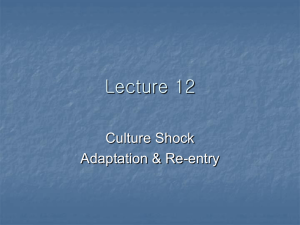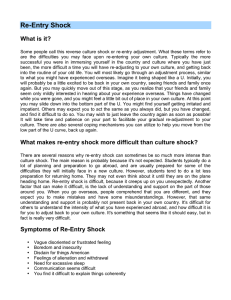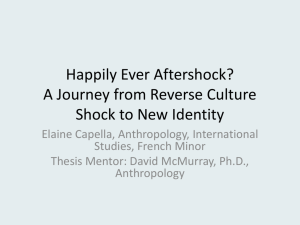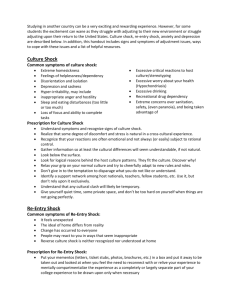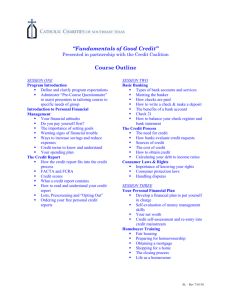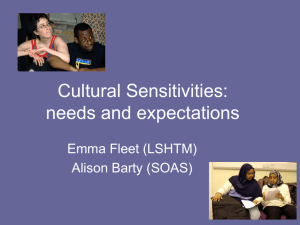Lecture 1
advertisement
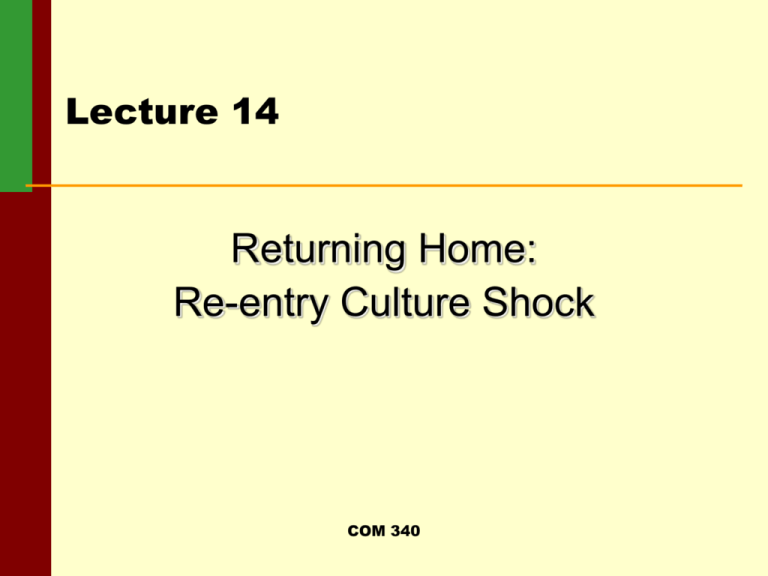
Lecture 14 Returning Home: Re-entry Culture Shock COM 340 W-Curve Theory According to this theory, the sojourner’s visit follows a predictable developmental pattern. First part is based on the “U-curve” sequence: euphoria, depression, rebuilding, adjusted. Then, upon re-entering the one’s home culture, the person repeats the U-curve sequence. Combining these two curves results in a “W-curve” 2 COM 340 W-curve Entry into New Culture Preliminary State Spectator State Adaptation State Shock State Participant State 3 Re-entry into Own Culture Preliminary State Spectator State Adaptation State Shock State Participant State COM 340 Stages of W-curve Preliminary Stage Spectator Stage 4 Making plans to leave Airplane tickets, passport, visa Packing and mailing clothing and books Sojourner sees many strange sights Has many new experiences Meets new people Things happen so fast, everything is a blur This honeymoon stage lasts from a few days up to 6 months. COM 340 Stages of W-curve (con’t) Participant Stage Sightseeing has ended, sojourner must fend for himself Housing, food, shopping, commuting, banking Must begin to accomplish tasks Shock Stage Problems 5 surface, many of which sojourner can’t handle by himself. Feeling of depression, lethargic irritable, critical of host country Tired of strange food; Work quality declines Feeling that the local people are indifferent to one’s struggles COM 340 Stages of W-curve (con’t) Adaptation Stage If this stage is reached, sojourner has progressed satisfactorily. In-group relations develop with locals Sense of belonging and acceptance develops Re-entry Stage Intercultural re-entry begins with preparations to return to home country Mailing off packages, moving out of housing, saying good-byes Arriving home to family and friends for the beginning of a new spectator/honeymoon stage 6 COM 340 Prof. Fontaine’s model of Culture & Re-entry Shock 7 COM 340 Re-entry Shock Occurs after you have returned home. Perhaps the most “shocking” because it is unexpected. You are a different person than when you left. Had new experiences Gained new understanding Developed new skills Learned new words or language Possibly developed different way of dress Have different interests and different opinions 8 COM 340 Re-entry Shock (con’t) Meanwhile, life at home has not stopped. People are older. Important things happened in their lives. People may not care about your experiences. They may feel that your experience has spoiled you, or made you snobbish or rude. They keep waiting for you to get back to “normal.” 9 COM 340 Upon returning from… …studying or living abroad, some common expectations: 10 Everything will be the same. Everything will be great. I will fit back into life with no problem. I can pick up my relationships where we left off. I have the same needs and goals as before. People will be open minded. People will be interested in my stories. People around me will recognize and applaud my personal growth. COM 340 Countering Re-entry Shock Understand that returning home involves an adjustment process similar to the one you experienced when first going abroad. Recommendations: 11 1. Share with sympathetic friends or family members some of the feelings you have had while living overseas. 2. Find informants about the US. Ask questions to get “tuned” back in. Play the foreigner. COM 340 Countering Re-entry Shock Recommendations: 12 (con’t) 3. Ask a friend to make a list of new terms and fads to learn what the current trends are. 4. Research various groups that may interest you: churches, clubs, student or professional organizations, international and intercultural groups. 5. Explore places where you might find others with international experience, or seek foreign nationals with whom you can speak the language you’ve learned and continue to share common experiences you’ve enjoyed. COM 340 Discussion Questions Cues and Symbols 1. What are some cues/signs/symbols… that you missed in an intercultural setting? that you have seen foreigners miss in your culture? that foreigners need to be aware of in your culture? Phases of Culture Shock 2. When experiencing CS, what are some coping strategies that you can use? 3. Describe your experience of going through CS. Personal Needs 4. When living abroad, what were (or what would be) some of your personal needs? 5. What do you think you just couldn’t live without? Personality Traits for Success 13 6. What personality traits are needed to have a successful stay abroad? Or, to have a successful return home? COM 340
